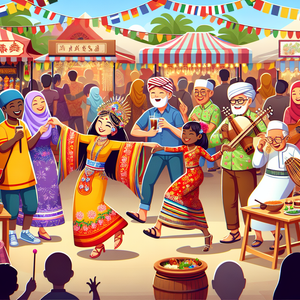The Evolution of McDonald's: From Fast Food to Global Icon

The story of McDonald's begins in 1940 when Richard and Maurice McDonald opened the first McDonald's restaurant in San Bernardino, California. They introduced the "Speedee Service System," which streamlined food preparation and delivery, paving the way for modern fast food. This innovative approach emphasized efficiency and affordability, becoming the hallmark of the brand. In 1954, Ray Kroc, a milkshake machine salesman, visited the McDonald brothers and recognized the potential beyond their single location. He became their franchising agent and opened the first franchised McDonald’s in Des Plaines, Illinois, in 1955. Under Kroc's leadership, McDonald's expanded rapidly, establishing a franchise model that would be emulated by countless other businesses. By the early 1970s, McDonald's had grown to over 1,000 locations across the United States, marking its position as a leader in the fast-food industry.
Cultural Impact and Global Expansion
The 1960s and 1970s marked significant milestones for McDonald's as it began to expand internationally. The introduction of the Big Mac in 1968 and the Happy Meal in 1979 were not just menu innovations; they became cultural icons in their own right. The Big Mac, with its unique combination of flavors and ingredients, became a symbol of American fast food, while the Happy Meal targeted families with children, offering a fun and appealing dining experience. As McDonald's entered the global market, it adapted its menu to local tastes while maintaining its core offerings. For instance, in India, the introduction of the McAloo Tikki burger catered to vegetarian preferences, showcasing the brand’s ability to respect cultural nuances while promoting its global identity. Today, McDonald's operates over 39,000 restaurants in more than 100 countries, making it one of the world's most recognizable brands.
Facing Challenges and Reinventing Itself
Despite its success, McDonald's has faced numerous challenges, particularly around health and nutrition concerns as the 21st century dawned. Criticism of fast food's contribution to obesity and unhealthy eating habits prompted McDonald's to reevaluate its menu and marketing strategies. In response, the company introduced healthier options, including salads, fruit, and low-calorie items, and committed to transparency in its nutrition information. Moreover, McDonald's began to embrace technology, with the introduction of self-service kiosks and mobile ordering, enhancing customer convenience and experience. The brand's adaptability in the face of shifting consumer preferences has been crucial to its ongoing relevance in a competitive market. Their "Experience of the Future" initiative aimed to revamp the dining experience, with modernized restaurant interiors and a focus on digital engagement.
The Future of McDonald's
Today, McDonald's continues to innovate and lead in the fast-food industry. The company is focusing on sustainability, aiming to source ingredients responsibly and reduce its environmental footprint. Initiatives such as using renewable energy, sustainable packaging, and committing to sourcing beef, chicken, and coffee from verified sustainable sources are part of McDonald's commitment to a greener future. Additionally, the brand remains a cultural touchstone, influencing trends in food and lifestyle. The recent collaborations with celebrities for limited-time menu offerings have drawn in younger audiences, keeping McDonald's in the conversation in an era dominated by social media and fast-paced change. Through its marketing strategies, McDonald's has managed to maintain a strong brand presence and adapt to the shifting landscape of consumer preferences.
The evolution of McDonald's from a small drive-in to a global icon is a testament to its ability to adapt, innovate, and resonate with diverse audiences. As it embraces new challenges and opportunities, McDonald's not only reflects changes in consumer behavior but also influences them. Its journey is a fascinating case study of how a brand can achieve enduring success by balancing tradition with innovation, making it an enduring symbol of American culture and a staple in the global fast-food landscape. As more people search for “McDonald's near me,” the brand’s ability to remain relevant and influential in a rapidly changing world is a testament to its legacy and ongoing evolution.
Fast Food Operations Manager
McDonald's, Burger King, Wendy's
Core Responsibilities
Oversee daily operations and ensure that all processes comply with health and safety regulations.
Manage staff scheduling, training, and performance evaluations to maintain a high standard of service.
Analyze sales data and customer feedback to optimize menu offerings and improve customer satisfaction.
Required Skills
Proven leadership experience in the food service industry, preferably in a fast-paced environment.
Strong analytical skills to interpret sales reports and market trends.
Excellent communication and interpersonal skills to motivate a diverse team.
Menu Development Specialist
McDonald's, Yum Brands, Subway
Core Responsibilities
Research and develop new menu items that align with consumer trends and dietary preferences, such as plant-based options.
Collaborate with marketing teams to create promotional strategies for new product launches.
Conduct taste tests and gather feedback to refine recipes before market introduction.
Required Skills
Culinary degree or equivalent experience in food product development.
Strong understanding of food science and nutrition.
Creativity and innovation in developing appealing and marketable food items.
Digital Marketing Strategist
McDonald's, Domino's Pizza, Starbucks
Core Responsibilities
Design and implement digital marketing campaigns to engage customers through social media, email, and online advertising.
Analyze campaign performance metrics and adjust strategies to maximize ROI.
Collaborate with cross-functional teams to align marketing efforts with brand objectives and promotions.
Required Skills
Experience in digital marketing tools, including SEO, PPC, and social media management platforms.
Strong analytical skills to interpret data and derive actionable insights.
Excellent written and verbal communication skills tailored for diverse audiences.
Sustainability Coordinator
McDonald's, Chipotle, Starbucks
Core Responsibilities
Develop and implement sustainability initiatives aimed at reducing the environmental impact of operations.
Track and report on sustainability metrics related to waste reduction, energy use, and sourcing practices.
Collaborate with suppliers and stakeholders to promote sustainable practices throughout the supply chain.
Required Skills
Knowledge of environmental regulations and sustainability practices in the food industry.
Strong project management skills to drive initiatives from concept to execution.
Excellent communication skills to convey sustainability goals to both internal and external audiences.
Customer Experience Analyst
McDonald's, Chick-fil-A, Panera Bread
Core Responsibilities
Gather and analyze customer feedback through surveys, social media, and direct interactions to enhance the dining experience.
Collaborate with operations and marketing teams to implement changes based on customer insights.
Monitor and report on industry trends to identify areas for improvement and innovation.
Required Skills
Experience in customer experience analysis or market research, preferably within the food service sector.
Proficiency in data analysis software and techniques to interpret customer data effectively.
Strong communication skills to present findings and recommendations to stakeholders.


